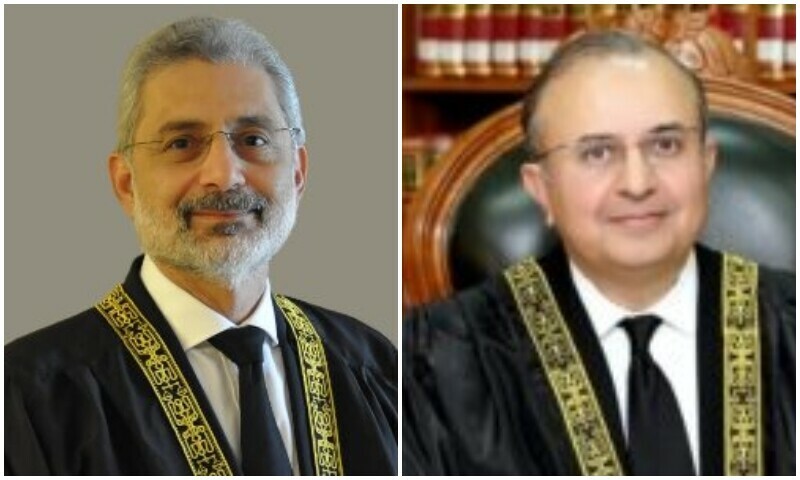
[ad_1]

• Claims the judge was ‘rude’, delayed key cases
• ‘Perturbed’ CJP terms Justice Mansoor’s boycott of panel for bench formation ‘contrary to law’
ISLAMABAD: After the senior puisne judge, Justice Mansoor Ali Shah, termed the changes to the bench formation committee by the Chief Justice of Pakistan a ‘one-man show’ and protested the removal of Justice Muneeb Akhtar from the three-man panel, CJP Qazi Faez Isa on Thursday said Justice Akhtar was replaced for several reasons, including his indifference to a piling backlog of cases.
In his four-page letter written on Sept 25, the CJP said Justice Akhtar ardently opposed the Practice and Procedure Act, which had also removed the dominance of the CJP over the Supreme Court.
Justice Akhtar was one of the two judges who availed full summer vacations being indifferent to the piling backlog of cases.
And while on vacation and not available for court work, Justice Akhtar insisted on participating in the committee meetings, suggesting his lack of trust in the next senior judge, the letter said.
The act stipulated that urgent cases were to be fixed within 14 days, but this statutory provision and the constitutional right to seek review were negated by Justice Akhtar’s refusal to hear urgent constitutional cases, the letter said.
Disrespecting those who were his seniors — the ad-hoc judges — and selecting 1,100 specific cases, Justice Akhtar confined himself to hearing only those cases, something wholly unprecedented.
The letter also regretted the alleged display of rude and unreasonable behaviour towards a distinguished member of the committee, comprising the CJP, senior puisne judge, and distinguished members of the bar.
The letter claimed that the bench headed by Justice Akhtar adjourned most cases and often finished its work before 11:00am, adding he issued stay orders regarding matters like the audio leak case.
While quick in granting injunctive relief in important constitutional cases, the judge then “never heard and decided these cases,” the letter regretted.
“Your comment that the country is in the midst of a constitutional crisis perturbs me,” he said, adding, “It is also inappropriate for a judge to say something which undermines political, economic and financial stability.”
‘Constitutional crisis’
CJP Isa also took exception to the use of the word ‘constitutional crisis’ by Justice Mansoor, asking what purpose the latter’s description of the present situation as a ‘constitutional crisis’ served.
On the appointment of Justice Aminuddin Khan as the third member of the committee, the CJP explained that the law (recently promulgated amending ordinance) empowered him to nominate any judge and that he had exercised his discretion for cogent reasons.
“However, you (Justice Mansoor) do not seem to consider other distinguished colleagues equal to the task,” the letter regretted, adding he trusted that the judge would consider the matter objectively and join the committee for the smooth functioning of the Supreme Court.
“Let each and every one of us play our part in the early disposal of accumulated cases,” the letter emphasised.
He also referred to the ultimatum that until Justice Akhtar was included in the committee, Justice Mansoor would not participate.
“With respect, what you demand is contrary to the law,” the CJP highlighted.
The letter claimed that Justice Yayha Afridi was not included in the committee because he was not available on Sept 20 and Justice Aminuddin was “kind enough to cancel going to Lahore” and accepted his request to be a part of the three-man panel.
It said Justice Mansoor conveyed to the registrar that he had another commitment and the meeting was adjourned due to his non-availability. But after two days, he decided to boycott the panel.
“Anyways, yesterday in front of you, I asked Justice Afridi and he said that he did not want to be on the committee,” the letter recalled.
About, what he called an absurd allegation levelled against the CJP of cherry-picking and undemocratic display of one-man-show, the letter said: “Your tiresome clichés do not controvert facts.”
Published in Dawn, September 27th, 2024
[ad_2]
Source link






